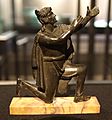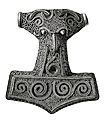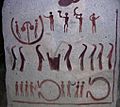Germanic paganism facts for kids
Germanic paganism was a religion. It was a form of paganism. It was practiced in Central an Northern Europe before Christianity came there. The best documented form is called Norse paganism today. The religion was polytheistic, there were many gods. The main ones seem to have been Odin and Thor. Beforehand, the most important one may have been Tyr.
Modern Influence
| Day | Origin |
|---|---|
| Monday | Moon's day |
| Tuesday | Tiw's (Tyr's) day |
| Wednesday | Wóden 's (Odin's) day |
| Thursday | Þunor's (Thor's) day |
| Friday | Frigg's day |
| Sunday | Sun's day |
The Germanic gods have affected elements of every day western life in most countries that speak Germanic languages. An example is some of the names of the days of the week. The days were named after Roman gods in Latin (named after Sun, Moon, Mars, Mercury, Jupiter, Venus, Saturn). The names for Tuesday through Friday were replaced with Germanic versions of the Roman gods. In English and Dutch, Saturn was not replaced. Saturday is named after the Sabbath in German, and is called "washing day" in Scandinavia.
Also, many place names such as Woodway House, Wansdyke, Thundersley and Frigedene are named after the old deities of the English people.
Images for kids
-
Emil Doepler's depiction of the Second Merseburg Charm, 1905. In the charm, gods from continental Germanic mythology heal a horse.
-
Map of the Roman Empire and Magna Germania, c. 120 CE
-
The Royal Mounds at Gamla Uppsala contains hundreds (originally thousands) of tumuli
-
A depiction of Saint Boniface destroying Donar's Oak from The Little Lives of the Saints (1904), illustrated by Charles Robinson.
-
The Fraubillen cross, a menhir resculptured into a cross.
-
This Thor's hammer in silver with filigree ornamentation was found in Scania. It was donated to the Swedish History Museum in 1895.
-
The Gundestrup cauldron, today in the National Museum of Denmark in Copenhagen.
-
Stone slab from The King's Grave in southern Sweden, Nordic Bronze Age, 1400 BC
-
A drinking scene on an image stone from Gotland, in the Swedish Museum of National Antiquities in Stockholm.
-
The Franks Casket, as displayed in the British Museum; the front and lid
See also
 In Spanish: Paganismo germánico para niños
In Spanish: Paganismo germánico para niños














